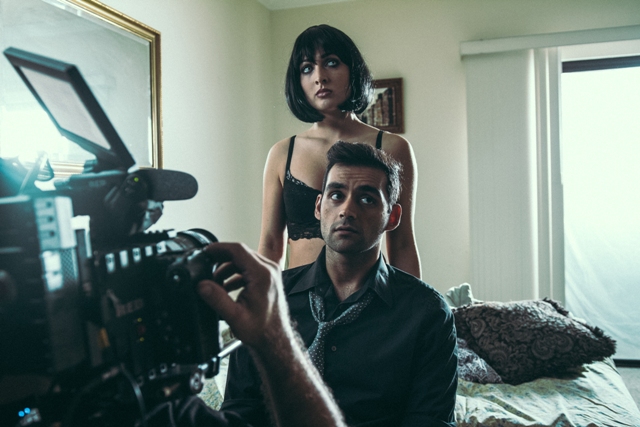The Asoka: ‘Don’t Put Me In A Box’
The Los Angeles-based rapper discusses racial stereotyping in America, featuring wrestlers on his sophomore album and going back to his roots for inspiration

The Asoka on the set of his upcoming music video for “Hollywood Girls.” Photo: Courtesy of the artist.
When Indian-American hip-hop artist Karan Batta was younger, he used to stay up late at night thinking about the kind of rap music and wrestling-themed videos he wanted to make. “I wanted to do a song with a bunch of wrestlers because I used to watch them on TV,” says the 27-year-old Los Angeles-based rapper, who also goes by his stage name The Asoka, over a phone interview.
Batta’s dream finally came true last year when he was called in to work on a theme song for Indian-American pro-wrestler Sonjay Dutt. “He invited me to hang out with a bunch of the wrestlers and I got to meet so many guys,” he recalls. One thing led to another: one of the wrestlers in the group showed Batta his own rapping skills, prompting the idea to invite more wrestlers to rap on a track together. “Team Asoka””” the tentative first single from Batta’s upcoming album The Asoka Hustle ”” now features bars from various wrestling champions including Dutt, Brian Kendrick, MVP, John Morrison, Rocky Romero, Katerina Waters and more. “A lot of [them] love hip-hop, so we ended up getting a whole roster on there,” explains Batta.
The Asoka Hustle, which releases in September, is Batta’s second record, and as he explains, his “most honest and open album to date.” The followup to his 2013 debut Heart of a Lion, the full-length release is “an intimate journey,” he says. “It’s like a time capsule of this period in my life which was about being young in Hollywood and meeting and working with my heroes.”
Honing his rap skills for the last 13 years, Batta briefly worked with producer and legend Dr. Dre [on the 2015 Dr. Dre album Compton and, as a screenwriter, on a commercial for him] recorded a track with American rapper Hittman and featured on an official mixtape released by Tupac Shakur’s estate in 2006. Also an actor [with two upcoming movies], Batta says that it’s tough to escape the clutches of stereotypes in most industries in America. He says, “When you go out to these auditions being Indian, they’ll give you a script and be like ”˜Can you do it in an Indian accent?’ I mean”¦ don’t put me in a box.”
It’s a similar situation in music, with many big record labels and audiences expecting a certain ”˜Indian-ness’ from him. “It does get frustrating sometimes,” he says. “I’ve been in meetings with major music companies in the world and they’ve said, ”˜Well you’re Indian, you have to rap in Hindi and be Bollywood, otherwise it won’t work.’ But Batta has decided to stick to his own brand of Tupac-influenced rap to break through the idea of what a rapper should or shouldn’t be. “I don’t look like a ”˜typical rapper’ but I feel in a way that works in my advantage,” says Batta.




